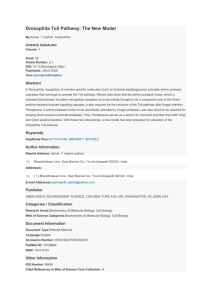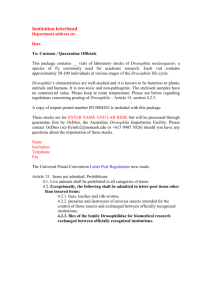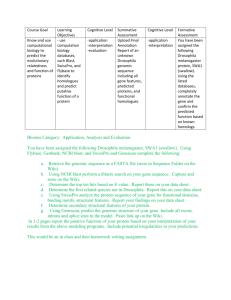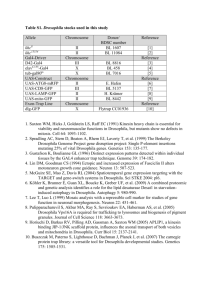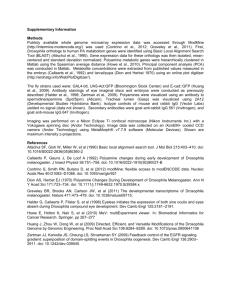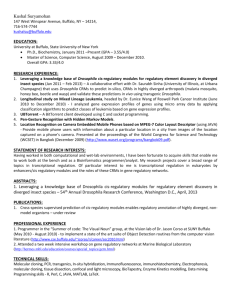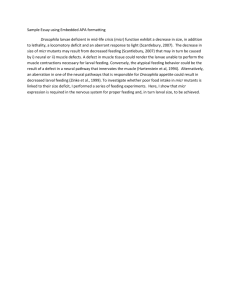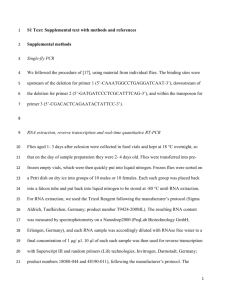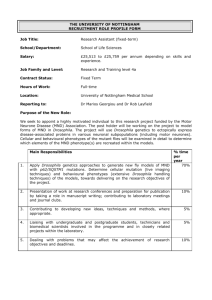Table_S1-Published information about Drosophila SPs
advertisement
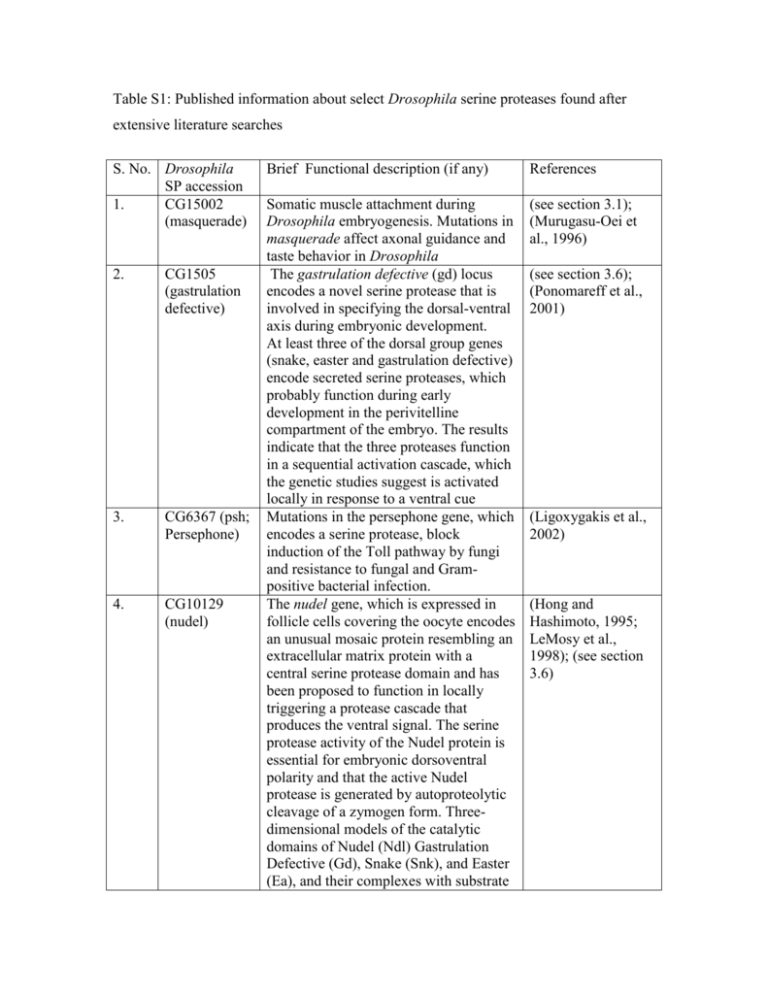
Table S1: Published information about select Drosophila serine proteases found after extensive literature searches S. No. Drosophila SP accession 1. CG15002 (masquerade) 2. CG1505 (gastrulation defective) 3. CG6367 (psh; Persephone) 4. CG10129 (nudel) Brief Functional description (if any) References Somatic muscle attachment during Drosophila embryogenesis. Mutations in masquerade affect axonal guidance and taste behavior in Drosophila The gastrulation defective (gd) locus encodes a novel serine protease that is involved in specifying the dorsal-ventral axis during embryonic development. At least three of the dorsal group genes (snake, easter and gastrulation defective) encode secreted serine proteases, which probably function during early development in the perivitelline compartment of the embryo. The results indicate that the three proteases function in a sequential activation cascade, which the genetic studies suggest is activated locally in response to a ventral cue Mutations in the persephone gene, which encodes a serine protease, block induction of the Toll pathway by fungi and resistance to fungal and Grampositive bacterial infection. The nudel gene, which is expressed in follicle cells covering the oocyte encodes an unusual mosaic protein resembling an extracellular matrix protein with a central serine protease domain and has been proposed to function in locally triggering a protease cascade that produces the ventral signal. The serine protease activity of the Nudel protein is essential for embryonic dorsoventral polarity and that the active Nudel protease is generated by autoproteolytic cleavage of a zymogen form. Threedimensional models of the catalytic domains of Nudel (Ndl) Gastrulation Defective (Gd), Snake (Snk), and Easter (Ea), and their complexes with substrate (see section 3.1); (Murugasu-Oei et al., 1996) (see section 3.6); (Ponomareff et al., 2001) (Ligoxygakis et al., 2002) (Hong and Hashimoto, 1995; LeMosy et al., 1998); (see section 3.6) 5. CG8867 (Ser4; Jon25Bi) 6. CG9564 (Try29F) 7. CG7996 (Snake; snk) 8. CG4920 (Easter; ea) 9. CG4316 (Stubblestubbloid) suggest a possible organization of the enzyme cascade controlling the dorsoventral fate of the fruit fly embryo Ser4, a gene encoding a trypsin-like serine protease was isolated and cloned in Drosophila melanogaster. Northern blot analysis reveals that the mRNA for the gene is expressed abundantly in the larval gut, suggesting a role in digestion for this protein Experimental evidence for the association between Ser4 and CG13045 from Y2H. The Drosophila melanogaster try29F gene encodes a protein that shares all known features of serine proteases like residues known to be involved in substrate specificity, catalysis and disulfide bond formation. In situ hybridization to mRNA in whole mount embryos shows that the expression of try29F is restricted to the posterior midgut during late embryogenesis. Experimental evidence for the association between Try29F and CG6866 (double-stranded RNA binding; cytokine and chemokine mediated signaling pathway; defense response) Three serine protease zymogens Gastrulation defective (GD), Snake (Snk) and Easter (Ea), and a nerve growth factor-like growth factor ligand precursor, Spaetzle, are required for specification of dorsal- ventral cell fate during Drosophila embryogenesis. (Refer to gd for more details) 1. Experimental evidence for the association between ea and CG11581 from Y2H. 2. Experimental evidence for the association between ea and ng1 (CG10781; structural molecule activity; puparial adhesion) from IntAct & Y2H. Stubble-stubbloid (Sb-sbd) locus that encodes an unusual type II transmembrane serine protease required (Ahrens and Mahoney, 1998) (Paululat, 1996) (see section 3.6) (see section 3.6); (Chen et al., 2004) (see section 3.6) 10. CG31039 (Ser99Dc; Jon99Ci; SER3) 11. CG11313 12. CG16705 (SPE) 13. CG1102 (MP1) 14. CG3066 (MP2) CG4821 (Tequila) 15. for normal leg and wing morphogenesis. mutations affecting the RhoA signaling pathway also interact genetically with mutations in the Stubble-stubbloid (Sbsbd) locus, suggesting that RhoA and Sb-sbd act in a common pathway during leg morphogenesis mRNA levels of SER3 appear to be negatively regulated by cAMP and along with SER1 and SER2 is abundantly expressed in larval gut suggesting a major function in digestion. Similar to prophenoloxidase-activating proteases; identified in small quantities in Drosophila larval hemolymph clot, suggesting that it may be associated with clotting and eventually immune response in Drosophila Spätzle-processing enzyme, required for Toll-dependent antimicrobial response in Drosophila Involved in activation of melanization in response to both bacterial and fungal infection Involved in activation of melanization chiefly in response to fungal infection A neurotrypsin orthologue, regulates long term memory formation in Drosophila and is essential for information processing in Drosophila (Yun and Davis, 1989) (Karlsson et al., 2004) (Mulinari et al., 2006) (Didelot et al., 2006) References Ahrens, J.E., Mahoney, P.A., 1998. Isolation and cloning of Ser4, a gene encoding a trypsin-like serine protease in Drosophila melanogaster. Biochim. Biophys. Acta 1395 141-4. Chen, G.C., Gajowniczek, P., Settleman, J., 2004. Rho-LIM kinase signaling regulates ecdysone-induced gene expression and morphogenesis during Drosophila metamorphosis. Curr. Biol. 14 309-13. Didelot, G., Molinari, F., Tchenio, P., Comas, D., Milhiet, E., Munnich, A., Colleaux, L., Preat, T., 2006. Tequila, a neurotrypsin ortholog, regulates long-term memory formation in Drosophila. Science 313 851-3. Hong, C.C., Hashimoto, C., 1995. An unusual mosaic protein with a protease domain, encoded by the nudel gene, is involved in defining embryonic dorsoventral polarity in Drosophila. Cell 82 785-94. Karlsson, C., Korayem, A.M., Scherfer, C., Loseva, O., Dushay, M.S., Theopold, U., 2004. Proteomic analysis of the Drosophila larval hemolymph clot. J. Biol. Chem. 279 52033-41. LeMosy, E.K., Kemler, D., Hashimoto, C., 1998. Role of Nudel protease activation in triggering dorsoventral polarization of the Drosophila embryo. Development 125 4045-53. Ligoxygakis, P., Pelte, N., Hoffmann, J.A., Reichhart, J.M., 2002. Activation of Drosophila Toll during fungal infection by a blood serine protease. Science 297 114-6. Mulinari, S., Hacker, U., Castillejo-Lopez, C., 2006. Expression and regulation of Spatzle-processing enzyme in Drosophila. FEBS Lett. 580 5406-10. Murugasu-Oei, B., Balakrishnan, R., Yang, X., Chia, W., Rodrigues, V., 1996. Mutations in masquerade, a novel serine-protease-like molecule, affect axonal guidance and taste behavior in Drosophila. Mech. Dev. 57 91-101. Paululat, A., 1996. Try29F, a new member of the Drosophila trypsin-like protease gene family, is specifically expressed in the posterior embryonic midgut. Gene 172 245-7. Ponomareff, G., Giordano, H., DeLotto, Y., DeLotto, R., 2001. Interallelic complementation at the Drosophila melanogaster gastrulation defective locus defines discrete functional domains of the protein. Genetics 159 635-45. Yun, Y., Davis, R.L., 1989. Levels of RNA from a family of putative serine protease genes are reduced in Drosophila melanogaster dunce mutants and are regulated by cyclic AMP. Mol. Cell. Biol. 9 692-700.
